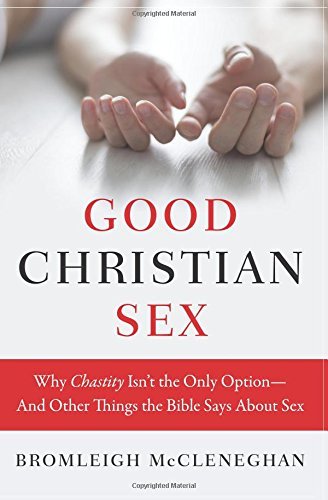First of all, the subtitle to the new book Good Christian Sex is Why Chastity Isn't the Only Option and Other Things the Bible Says About Sex. That pretty well positions the views of this author, a minister and the daughter of a minister.
What I write about is not the rights and wrongs of sex, but instead its relationship to spiritual experience. While this new book is largely about sexual ethics, it also has given me a new perspective on my subject, one I'm startled to find I've neglected.
THE OUT-OF-THIS-WORLD FOCUS
My strongest view on the subject is that sex can free us from the narrow confines of ourselves -- for a few moments when neither time or space quite exist in the usual way.
Author Bromley McCleneghan does recognize this, "the sense of standing outside oneself, outside of time ... letting go of control and self-consciousness." She quotes Karen Lebacqz, a theological ethicist -- I didn't know there was such a job description -- saying, "'Sex, passion and eros are antidotes to the human sin of wanting to be in control or to have power over another.'"
Yet McCleneghan's emphasis is on union:
There's a history in Christian thought of describing sex -- holy, good sex -- as sacramental; a point of ecstatic connection with our partner, a collapsing of the distance that separates us from all other people, and even a collapsing of the distance between humanity and God ... Though I believe in the possibility of ecstatic communion between God and humanity, and certainly of the communion of bodies and souls possible in intimate acts and relationships between humans, I think those experiences can be hard to come by ... There is a distinct difference between actually losing the boundaries of one's self and the ecstatic joining of hearts and bodies that sometimes happens in the best sex. What we want to aim for, what we sometimes get,is deep, intimate connection, not the annihilation of parts of ourselves.
RE-WONDERING
Reading this, I realized the degree to which I make more of a deal out the moments of seeming dissolution than of union. Perhaps because I'm both tightly wound and still, at my advanced age (67), a bit rebelliously independent-minded. I need intervals of feeling loose as smoke, within my 33-year monogamous marriage.
Reading Good Christian Sex is making me wonder at that emphasis on out-of-this-world.
MARRIAGE? NOT NECESSARILY
Most of the book is about Christian sexual ethics that don't insist on marriage. The core of the argument is based on John 10:10, Jesus saying: "I am come that they might have life, and that they might have it more abundantly." Decisions, this author argues, need to be based on whether the sexual activity is contributing to this abundant life.
But "if sexual pleasure is a good, and God desires for us to live an abundant, joy-filled life in our divinely crafted bodies, what's to keep us from banging everyone we possibly can...?" The author does not believe such promiscuity is in keeping with a truly rich life.
Consulting a trusty source of wisdom, I found that Wikipedia defines abundant life as "life in its abounding fullness of joy and strength for mind, body, and soul."
McCleneghan consults the apostle Paul, quoting 1 Corinthians 6:20, "...Glorify God in your body..."
I think we intuitively know what experiences offer life in its abounding fullness and which are empty or potentially destructive. Acting on that awareness is a different matter.
I did not find in the book a strong argument that the Bible says very much that's specific to sex. McCleneghan writes:
The call of the gospel is not to protect ourselves at all costs, but to risk ourselves in love. Not always, not with the whole rugby team or all the ladies in the marketing department, but nonetheless with hope, wisdom, and courage.
Crucial to her theology is this: always put first respect for the autonomy, humanity, and wishes of the partner.
Not an easy standard to meet and not an easy-to-use guide for decision-making. Yet so much wiser than a great deal of traditional theological ethic-izing on the subject. One need not be a Christian to find this book valuable.
